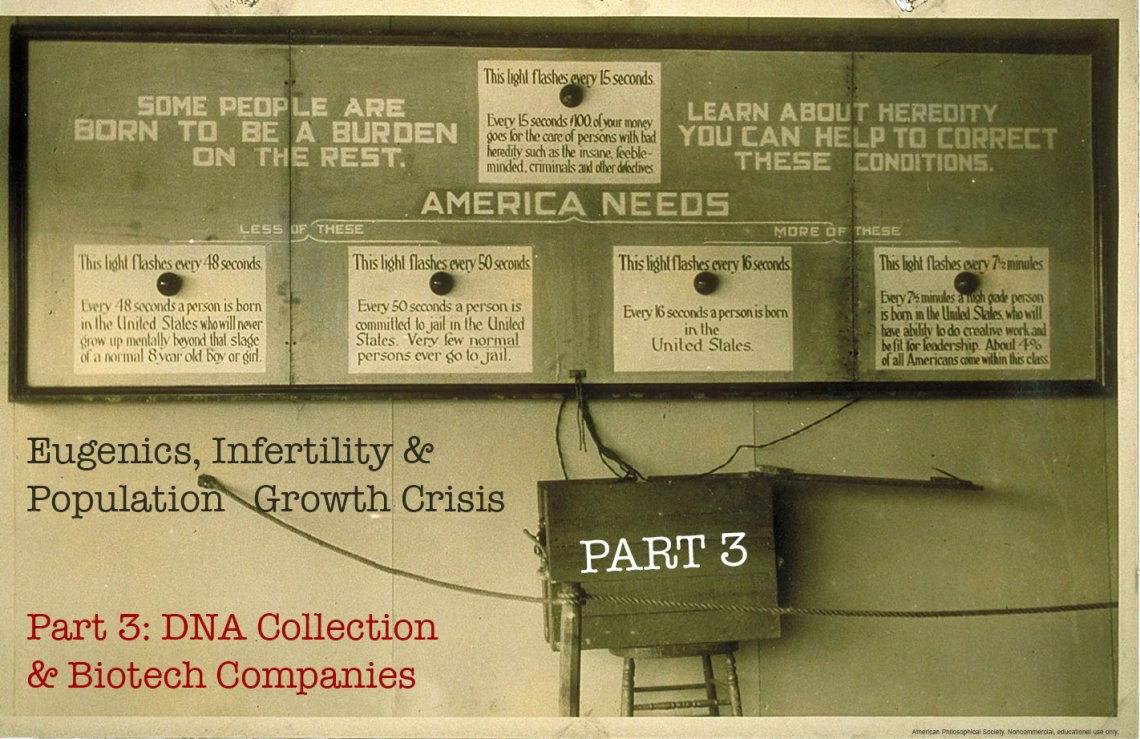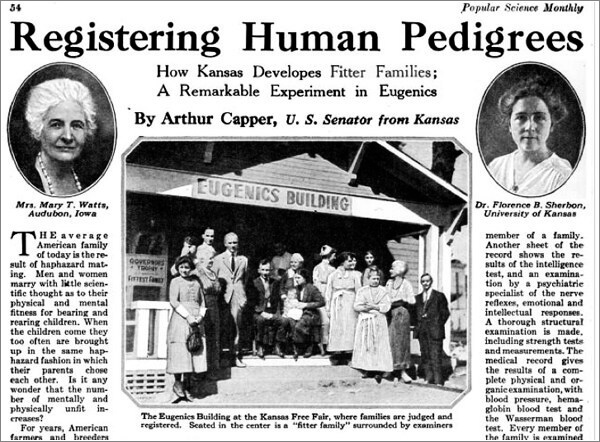Eugenics, Infertility & Population Growth CRISIS Part 3
by Corey Lynn, Corey’s Digs:

Since the dawn of eugenics, they’ve tried to trace the pedigree and traits of human beings so as to control the masses. Through DNA, they have not only accomplished this, they have extended a branch to the population to show off their ancestral trees. Much like in the days of pedigree fairs, people had no idea what they were signing up for.
• Bill Gates funded scientists to study 40,000 DNA samples from 23andMe and assessed genes having to do with preterm labor and God knows what else.
• Billionaires, government and big pharma are investing in biotechnology companies that transform cells and rewrite DNA, amassing the world’s largest stores of “usable” designer genetic code.
• 30 million Americans have already voluntarily submitted their DNA to the likes of 23andMe, Ancestry, MyHeritage, Genomelink and several others.
READ Parts 1 & 2 first:
Part 1: Eugenics, Infertility & Population Growth Crisis (extensive historical timeline)
Part 2: The Rockefeller Foundation’s Plan to Sterilize Through Anti-fertility Vaccines & Crops
DNA Database Collection – A Scientists Dream
The history of eugenics, published in the eugenics archive, explains that eugenics researchers had attempted to trace the inheritance of a trait through a family tree, or pedigree, by analyzing their genetics. However, at that time they were not aware that DNA was the molecule of heredity. Today, they use these DNA “markers” to follow trait inheritance. Back in the early 1900s they had to conduct interviews on medical histories, which were submitted to the Eugenics Record Office in New York, where they stored documentation on family genealogy with traits and medical conditions.

Eugenicists, mostly known as “philanthropists” in this day and age, spent decades compiling information on populations, under the guise of “medical records.” From the moment you step into a doctor’s office, you are briskly filling out forms, describing yours and your families entire health background. From school forms to maternal databases, the Electronic Health Records (EHR) put in place by Barack Obama, and the mandatory diabetes registry Thomas Frieden established in New York, the number of databases collecting data on every individual – is frankly, off the charts. Rest assured, whatever isn’t collected directly from you, is being collected by big tech, all the way down to what road you are driving down to what pair of underwear you purchased online yesterday. There is a reason for all of this data collection. What communities are the poorest? What people are carrying diseases or deformities? What’s everyone’s race? But indeed, it didn’t stop there. They needed more – they wanted your DNA.
In years that followed, biotech companies sprouted up, DNA databases were growing wings, and genetic testing services became wildly popular, as the naïve began submitting their saliva samples to learn about their ancestry and personal traits. Don’t feel bad if you were one of the “naïve,” – while you were doling out your privacy, they were duping millions of other Americans as well. Little did everyone know that all of this data is being stored, bloodlines are being documented, genetic markers traced, scientists are analyzing it, and law enforcement is using it in conjunction with their national database because it provides more specific markers. Sure, solving a cold case file on a murderer is fantastic news, and curing cancer would be phenomenal if they were ever to release the cure, but what else might they be compiling all of this data for?
For those claiming “tinfoil hat,” here’s a quick lesson in how capitalism works. You don’t give away the farm for free unless you are getting something spectacular in return. Ask yourself – why do they want all of this data? Are they looking to heal the world OR shape the world?
Companies such as 23andMe, Ancestry, MyHeritage, Genomelink, Promethease, Lifenome, GEDmatch, Family Tree DNA, and numerous others have flooded the market, enticing people to submit their saliva samples for FREE testing and extraordinary information on their heritage, traits, and health. Isn’t that sublime? And, they’ve become such a hit, that many of them have setup affiliate marketing so that others can promote this wonderful service of collecting your genetics.
For example, Genomelink tells you that you should “go beyond genealogy and health risk to discover how DNA shapes aspects of your daily life that you care about. Instant access to 25 trait reports upon uploading your raw data, with 100+ total trait reports available.” What can you learn about yourself, or shall we say… what will they learn about you? According to their website, they can assess your intelligence, personality, physical traits, and even food & nutrition. Isn’t that something? They don’t gloat about the fact that they can also trace your genealogy, while telling you how “intelligent” you may be. Genomelink is very excited about the fact that almost 30 million Americans have already been tested in the Unites States alone.
If you sign up with Lifenome, you will receive a comprehensive analysis of your DNA on nutrition, fitness, skincare, allergy and personality. Its’ wonderful AI+ Genomics engine can assess the cumulative effect of multiple genetic variants that may just have an impact on your wellness.
In Bill and Melinda Gates 2019 annual letter, titled ‘We Didn’t See This Coming,’ they talk about at-home DNA tests under “Surprise #2.” The Gates Foundation helped fund a 23andMe study, whereby scientists reviewed more than 40,000 samples and discovered a potential link between preterm labor and six genes – including one that regulates how the body uses the mineral selenium. Apparently, some people have a gene that doesn’t allow them to process selenium properly. Therefore, mothers who carry that gene are more likely to give birth early, suggesting selenium plays a factor in when a woman begins labor. While their researchers work on breakthroughs for this, a team at Stanford is developing a blood test that can determine how soon a woman will give birth.
The Gates are essentially funding and running the worldwide vaccine industry, which is causing a great deal of injury – in some cases permanent, causing infertility, and even death, with a very good chance that it is also increasing the child mortality rate in developing countries. So why not “invest” in cures for child mortality as well? Oh, but they have. In fact, just this month they gave another $180 million to CHAMPS, a global health network headquartered in the Emory Global Health Institute. That brings their investment in CHAMPS up to $271 million to date.
While all of these services purport ways of helping you to become the best “you” possible, they are cataloging terabytes of personal data, family history, ancestry, intelligence, medical markers, and a myriad of other traits. Scientists everywhere are having the time of their lives. Some want this data so bad, they are willing to offer this DNA collecting service for free, and of course for those that charge, you can easily find these kits at your local Walgreens or online at Amazon.
Food for thought for the next time you see an ad for “find out all about your ancestry!” – while we collect your DNA.
Biotech Companies Flourish
From biotechnology to genomes and genetics, it’s been all the buzz for scientists, philanthropists, and the wealthy. Companies have sprung up everywhere since the last 70s, just a few years after the sterilization law was repealed. Genetech was the first publicly traded biotech company in 1980.
For six billionaires, their intrigue continued to grow, along with their investments. Bill Gates, Jeff Bezos, Richard Branson, Michael Bloomberg, Peter Theil, and Walt Disney’s great-nephew Tim Disney have all invested in various biotech companies over the past few years. In fact, according to Family Capital’s estimate, roughly 20% of investments done by family offices goes into biotech or related industries. Investments in synthetic biology start-ups has increased from $374 million in 2012 to $1.2 billion in 2016, according to data from CB insights.
What is biotech exactly? It is the exploitation of biological processes for industrial and other purposes, especially the genetic manipulation of microorganisms for the production of antibiotics, hormones, and “other such needs.” According to Forbes, these are the top ten biotech companies in the U.S., but rest assured, there are plenty more out there, and some of these have global locations.
Loading...


